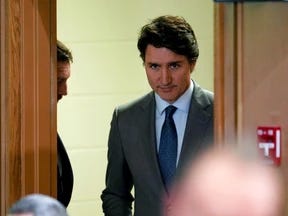The Long Game
When it comes to Chinese interference in Canadian affairs, Justin Trudeau can’t see the forest for the trees – or doesn’t want to
This week we learned what Prime Minister Justin Trudeau knew about interference by the People’s Republic of China in Canada’s 2019 and 2021 federal elections. His testimony to the Foreign Interference Commission revealed a severe case of wilful blindness, to borrow a phrase from journalist Sam Cooper, who wrote an eponymous book on the subject. And it’s an affliction that puts all Canadians at risk.
First, as he did in the SNC Lavalin Inquiry, Trudeau tossed those around him under the proverbial bus. He testified that he had a lot to read as Prime Minister: if something was truly important, officials needed to bring it to his attention. Translation: they didn’t do their job, so how could you expect me to do mine?
But apparently, CSIS director David Vigneault did do his job. Vigneault testified that Trudeau had been briefed about CSIS’ concerns of Chinese interference so often that the words no longer needed to be said. Assuming, of course, that the PM wanted to hear them.
Second, Canadians learned that Trudeau knew as early as 2019 that CSIS believed Chinese officials helped former Liberal MP Han Dong win his nomination. Of the intel he received, Trudeau stated,
“I didn’t feel there was sufficient or sufficiently credible information that would justify this very significant step as to remove a candidate.”
What struck me here was how Trudeau dismissed the alleged interference as political “business as usual.” A summary of Trudeau’s pre-hearing inquiry read,
“PM Trudeau noted that CSIS agents, with all their expertise, might not know how nomination processes typically unfold. He said that he and Mr. Broadhurst (the Liberal party campaign director who had brought the issue to Trudeau’s attention) had perhaps a greater understanding of nomination realities than the agents involved. The buses seemed like a ‘smoking gun’ for some analysts; they were not for someone who works in a political party.”
Testifying at the Commission, Trudeau equated the bussing of Chinese students to Dong’s 2019 nomination in Don Valley North to the bussing of Greek and Italian constituents to his own nomination in Papineau in 2007.
The analogy is absurd. Unlike China, Greece and Italy aren’t hostile powers. They aren’t at loggerheads with our allies, in fact, they ARE our allies. They didn’t freeze canola imports as part of their outrage over Canada’s detention of Huawei executive Meng Wang Zhou, accused of violating US law on transactions with another unfriendly nation, Iran. They didn’t then kidnap two of our citizens and hold them prisoner for three years on trumped up charges. All of which China did under Trudeau’s watch, which you think would warrant additional scrutiny.
Third, Trudeau stated that he didn’t think China had an interest in a particular party winning the 2021 election. He testified,
“While individual [Chinese] officials may well have expressed a preference or another, the impression we got and consistently would get is that … it just would seem very improbable that the Chinese government itself would have a preference in the election.”
This is a ludicrous statement, considering that China has expressed clear preferences about parties winning elections in other countries. Most recently, it interfered shamelessly in Taiwan’s January vote and set up a disinformation network to interfere in the United States 2024 presidential election.
Trudeau is right about one thing: interference didn’t change the overall outcome of the 2021 election. Even though the Conservatives claim they lost several seats to interference efforts, the Liberals would have won anyway. But that wasn’t the point. And the fact the Trudeau either missed the point or deliberately ignored it is what’s most concerning.
The point is this: China plays the long game. It’s not just about winning one federal election, or helping install an MP whose spouse then happens to get a job with a company engaged in CCP propaganda efforts. It’s not about buying a few Canadian mining interests, setting up a Belt and Road port in BC, or establishing a Buddhist monastery in PEI as a front for a massive land grab. It’s about all these things, and more, together. It’s about putting in place the elements needed to win the long game: taking control of Canada’s levers of power and production to be able to use them for China’s purposes.
Keep reading with a 7-day free trial
Subscribe to In My Opinion to keep reading this post and get 7 days of free access to the full post archives.



